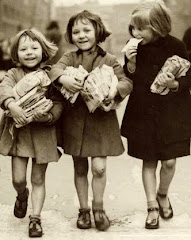Naomi Shihab Nye’s book of poetry 19 Varieties of Gazelle was an illuminating text that made me question some of my own beliefs about the Middle East and the world in general. The title does nothing to really prepare the reader for what they are about to encounter as they flip through page after page of thoughtful reflections, remembrances, and dreams. Not only does Nye’s book provide her readers with an insider’s look into life as Middle Easterner, she also provides deep insight into the often forgotten and misunderstood culture of a faraway land. Nye uses her experiences and knowledge to create a bridge between different worlds and creates images that unite.
What I enjoyed the most about Nye’s poetry was the sense of self that is examined and reflected in many of the poems about either her own experiences or the experiences of her family and friends from around the world. Nye illustrates the struggle of many to remain true to their family’s and culture’s beliefs within the ever-expanding reach of the western world. In their struggle though, many are able to find a balance and accept the old with the new. Her father is able to live in America with his daughters and constantly tells them how lucky they are to have opportunity and freedom in the United States, and yet, he maintains many of the traditions of his own people within his new land. This struggle is felt by many, but especially those who come from cultures that are misunderstood by westerners in issues surrounding social mores and norms. I enjoyed learning more about Middle Eastern culture, especially the recurring theme of hospitality.
One of my favorite poems form the collection is “Red Brocade.” This poem not only brings up the importance of hospitality in Arabic culture and history, but also presents the reader with a strong desire to return to simpler times when sharing what you had was more important than pining for what you lacked. I love thinking that there was a time when a stranger would come to the door and you would care for him for three days “before asking who he is/ where he’s from/ where he’s headed” (40). A time when trust was given and received. My favorite lines of the poem offer the reasoning for waiting these three days; “That way, he’ll have strength/ enough to answer./ Or, by then you’ll be/ such good friends/ you don’t care” (40). By ending with the single line of “you don’t care” I felt a sense of hope that people could see beyond the differences and notice only the similarities between people, the things that make us human. Why should people care about the ways we differ when there are so many more ways that we are the same?
Continuing on with identifying the ways in which people are the same, I come to the other thing I noticed about Nye’s poetry that I really enjoyed. Nye is able to present the differences while providing readers with similarities. As I read the poems I could see the stories behind them in my mind. I knew that she was describing a place that I had never been before, but it was a place I wanted to visit. I wanted to surround myself with children running around in “little suitcoats/ and velvet dresses….eating 47 Jordan almonds,” (59) I wanted to see the gardens that have been tended so carefully, the grandmothers caring for their grandchildren, people laughing and singing. There were so many things that seemed a natural part of human existence within her poems, that although they were centered around people and places that I know little about, I know those feelings and experiences all the same; love, hope, fear, desire, all things that are a part of my life the way they are a part of all human experience—or at least they should be.
I think Nye’s collection of poems could teach the world a thing or two about understanding others. Even though the people and situations may be different the experiences are often startlingly similar. Her poems express a desire for peace and understanding between people and she brings to life the unseen, innocent victims of extenuating circumstance. She tells in a poem about “Mr. Dajani Calling from Jericho” in which he desires only letters and books, saying how even though bombs are being dropped on them from American planes, “I want you to know/ we never stop holding our branch of the olive tree/ even though for some it is such a little branch” (131). But, I think the quote on dedication page brings the point home for all, “If you look at the Muslim, Christian, and Jewish religions, their first commandments are the same: ‘Thou shalt not kill.’ It’s not taken seriously.”
Subscribe to:
Post Comments (Atom)

Meredith, I absolutely agree on the connection between the two worlds, I thought that was a really important part of the book. Oh, and good call on the cover poem translated on the back cover flap, I didn't even notice that. Color me embarassed. I thought it was interesting that you brought up the quote on the dedication page because I noticed that too. Mainly because that's not the first commandment. It didn't "bother" me, but I noticed it, you know what I mean? I also really liked "Red Brocade" for the same reasons you did. We're not friendly enough these days.
ReplyDelete